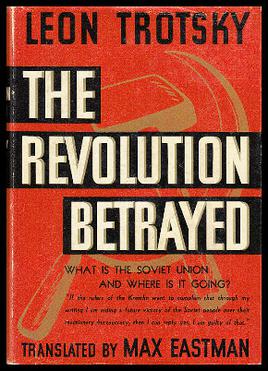
Leninism is a political ideology developed by Russian Marxist revolutionary Vladimir Lenin that proposes the establishment of the dictatorship of the proletariat led by a revolutionary vanguard party as the political prelude to the establishment of communism. Lenin's ideological contributions to the Marxist ideology relate to his theories on the party, imperialism, the state, and revolution. The function of the Leninist vanguard party is to provide the working classes with the political consciousness and revolutionary leadership necessary to depose capitalism.
State capitalism is an economic system in which the state undertakes business and commercial economic activity and where the means of production are nationalized as state-owned enterprises. The definition can also include the state dominance of corporatized government agencies or of public companies in which the state has controlling shares.

Trotskyism is the political ideology and branch of Marxism developed by Russian revolutionary Leon Trotsky and some other members of the Left Opposition and Fourth International. Trotsky described himself as an orthodox Marxist, a revolutionary Marxist, and a Bolshevik–Leninist as well as a follower of Marx, Engels, Vladimir Lenin, Karl Liebknecht, and Rosa Luxemburg.

The Fourth International (FI) was established in France in 1938 by Leon Trotsky and his supporters, having been expelled from the Soviet Union and the Communist International.
Bolshevism is a revolutionary socialist current of Soviet Leninist and later Marxist–Leninist political thought and political regime associated with the formation of a rigidly centralized, cohesive and disciplined party of social revolution, focused on overthrowing the existing capitalist state system, seizing power and establishing the "dictatorship of the proletariat".
New class is a polemic term by critics of countries that followed the Soviet-type state socialism to describe the privileged ruling class of bureaucrats and Communist party functionaries which arose in these states. Generally, the group known in the Soviet Union as the nomenklatura conforms to the theory of the new class. The term was earlier applied to other emerging strata of the society. Milovan Đilas' new-class theory was also used extensively by anti-communist commentators in the Western world in their criticism of the Communist states during the Cold War.
Shachtmanism is the form of Marxism associated with Max Shachtman (1904–1972). It has two major components: a bureaucratic collectivist analysis of the Soviet Union and a third camp approach to world politics. Shachtmanites believe that the Stalinist rulers of proclaimed socialist countries are a new ruling class distinct from the workers and reject Trotsky's description of Stalinist Russia as a "degenerated workers' state".
Max Shachtman was an American Marxist theorist. He went from being an associate of Leon Trotsky to a social democrat and mentor of senior assistants to AFL–CIO President George Meany.
Socialist democracy is a political system that aligns with principles of both socialism and democracy. It includes ideologies such as council communism, democratic socialism, social democracy, and soviet democracy, as well as Marxist democracy like the dictatorship of the proletariat. It was embodied in the Soviet system (1922–1991). It can also denote a system of political party organization like democratic centralism, or a form of democracy espoused by Marxist–Leninist political parties or groups that support one-party states. The Socialist Federal Republic of Yugoslavia (1945–1992) styled itself a socialist democracy, as did the People's Republic of Bulgaria (1946–1990) and the Socialist Republic of Romania (1947–1989).

Before the perestroika Soviet era reforms of Gorbachev that promoted Eurocommunism, the majority of its history it went the formal ideology of the Communist Party of the Soviet Union (CPSU) was Marxism–Leninism, a form of socialism consisting of a centralised command economy with a vanguardist one-party state that aimed to realize the dictatorship of the proletariat. The Soviet Union's ideological commitment to achieving communism included the national communist development of socialism in one country and peaceful coexistence with capitalist countries while engaging in anti-imperialism to defend the international proletariat, combat the predominant prevailing global system of capitalism and promote the goals of Russian Communism. The state ideology of the Soviet Union—and thus Marxism–Leninism—derived and developed from the theories, policies and political praxis of Marx, Engels, Lenin and Stalin.
Marxism is a method of socioeconomic analysis that originates in the works of 19th century German philosophers Karl Marx and Friedrich Engels. Marxism analyzes and critiques the development of class society and especially of capitalism as well as the role of class struggles in systemic, economic, social and political change. It frames capitalism through a paradigm of exploitation and analyzes class relations and social conflict using a materialist interpretation of historical development – materialist in the sense that the politics and ideas of an epoch are determined by the way in which material production is carried on.
Bureaucratic collectivism is a theory of class society. It is used by some Trotskyists to describe the nature of the Soviet Union under Joseph Stalin and other similar states in Central and Eastern Europe and elsewhere.
The third camp, also known as third camp socialism or third camp Trotskyism, is a branch of socialism that aims to oppose both capitalism and Stalinism by supporting the organised working class as a "third camp".
State socialism is a political and economic ideology within the socialist movement that advocates state ownership of the means of production. This is intended either as a temporary measure, or as a characteristic of socialism in the transition from the capitalist to the socialist mode of production or to a communist society. State socialism was first theorised by Ferdinand Lassalle. It advocates a planned economy controlled by the state in which all industries and natural resources are state-owned.
A political revolution, in the Trotskyist theory, is an upheaval in which the government is replaced, or the form of government altered, but in which property relations are predominantly left intact. The revolutions in France in 1830 and 1848 are often cited as political revolutions.

The Revolution Betrayed: What Is the Soviet Union and Where Is It Going? is a book published in 1936 by the exiled Soviet leader Leon Trotsky. This work analyzed and criticized the course of historical development in the Soviet Union following the death of Vladimir Lenin in 1924 and is regarded as Trotsky's primary work dealing with the nature of Stalinism. The book was written by Trotsky during his exile in Norway and was originally translated into Spanish by Victor Serge. The most widely available English translation is by Max Eastman.
Revolutionary socialism is a political philosophy, doctrine, and tradition within socialism that stresses the idea that a social revolution is necessary to bring about structural changes in society. More specifically, it is the view that revolution is a necessary precondition for transitioning from a capitalist to a socialist mode of production. Revolution is not necessarily defined as a violent insurrection; it is defined as a seizure of political power by mass movements of the working class so that the state is directly controlled or abolished by the working class as opposed to the capitalist class and its interests.
In Trotskyist political theory, deformed workers' states are states where the capitalist class has been overthrown, the economy is largely state-owned and planned, but there is no internal democracy or workers' control of industry. In a deformed workers' state, the working class has never held political power like it did in Russia shortly after the Russian Revolution. These states are considered deformed because their political and economic structures have been imposed from the top, and because revolutionary working class organizations are crushed. Like a degenerated workers' state, a deformed workers' state is considered to be a state that cannot be transitioning to socialism.
Orthodox Marxism is the body of Marxist thought which emerged after the death of Karl Marx and Friedrich Engels in the late 19th century, expressed in its primary form by Karl Kautsky. Kautsky's views of Marxism dominated the European Marxist movement for two decades, and orthodox Marxism was the official philosophy of the majority of the socialist movement as represented in the Second International until the First World War in 1914, whose outbreak caused Kautsky's influence to wane and brought to prominence the orthodoxy of Vladimir Lenin. Orthodox Marxism aimed to simplify, codify and systematize Marxist method and theory by clarifying perceived ambiguities and contradictions in classical Marxism. It overlaps significantly with Instrumental Marxism.
A socialist state, socialist republic, or socialist country, sometimes referred to as a workers' state or workers' republic, is a sovereign state constitutionally dedicated to the establishment of socialism. The term communist state is often used synonymously in the West, specifically when referring to one-party socialist states governed by Marxist–Leninist communist parties, despite these countries being officially socialist states in the process of building socialism and progressing toward a communist society. These countries never describe themselves as communist nor as having implemented a communist society. Additionally, a number of countries that are multi-party capitalist states make references to socialism in their constitutions, in most cases alluding to the building of a socialist society, naming socialism, claiming to be a socialist state, or including the term people's republic or socialist republic in their country's full name, although this does not necessarily reflect the structure and development paths of these countries' political and economic systems. Currently, these countries include Algeria, Bangladesh, Guyana, India, Nepal, Nicaragua, Sri Lanka and Tanzania.





